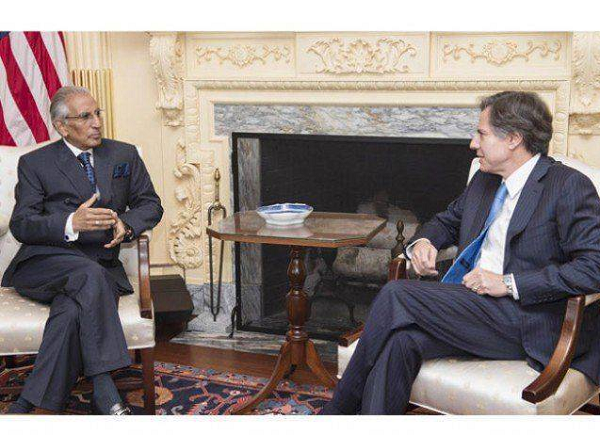
by Editor | May 25, 2021 | Muslim World

Tariq Fatemi in a meeting US ambassador David Hale. PHOTO: FILE
ISLAMABAD, (IANS): Pakistan on Monday summoned the US ambassador to the foreign ministry and protested over the Saturday drone strike in southwest of the country, that killed Taliban chief Mullaha Akhtar Mansoor.
The US envoy David Hale was called in by Special Assistant to the Prime Minister on Foreign Affairs Syed Tariq Fatemi to express concern over the drone strike on Pakistani territory on Saturday, a statement released by Pakistan’s foreign ministry said.
“Fatemi pointed out that the drone strike was a violation of Pakistan’s sovereignty and a breach of the United Nation’s Charter that guarantees the inviolability of the territorial integrity of its member states,” said the statement.
The special assistant also emphasized that such actions could adversely impact the ongoing efforts by the Quadrilateral Coordination Group for facilitating peace talks between the Afghan Government and the Taliban.
Talking about the coordination on terrorism between the two countries, Fatemi also underlined that Pakistan and the US had been closely coordinating in the fight against the menace of terrorism and that this cooperation needed to be maintained.
Afghan Taliban leader Mullah Akhtar Mansoor was killed in the drone strike on his vehicle in a small town Ahmad Wal in Nushki district of Pakistan’s south-west province of Balochistan, which borders Afghanistan.
US President Barack Obama confirmed the killing.
“We have removed the leader of an organization that has continued to plot against and unleash attacks on American and coalition forces, to wage war against the Afghan people, and align itself with extremist groups like Al Qaeda,” said Obama in a statement.
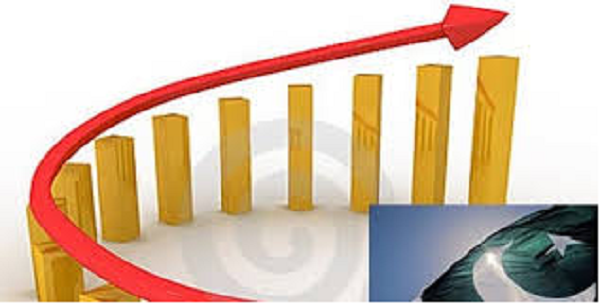
by Editor | May 25, 2021 | Muslim World
Islamabad, (IANS) Pakistan missed its economic growth target for the current financial year by a wide margin mainly because of widespread dismal performance by the agriculture sector, a media report said on Saturday.
The gross domestic product (GDP) grew by 4.7 percent against the target of 5.5 percent, Dawn online reported.
At a meeting on Friday of the national accounts committee comprising senior representatives from the four provinces and regions and technical experts, the performance of all economic sectors were added up that showed higher than targeted growth by the industrial sector. The services sector achieved its growth target of 5.7 percent.
But the most worrying aspect of the year was a 0.19 percent negative growth by agriculture as a whole against the target of 3.9 percent.
Cotton output led the free-fall in the agriculture sector, considered the backbone of the national economy, as it posted a negative growth of 27 percent. T
Important crops output fell by 7.18 percent against the target of 3.2 percent, while other crops fell by 6.2 percent against the target of 4.5 percent.
Wheat production grew by a meagre 0.61 percent to 25.47 million tonnes.
On an overall basis, industry grew by 6.8 percent against the target of 6.4 percent. Last year, industry had grown only by 3.6 percent.
The most important sector in industrial domain – large scale manufacturing (LSM) – also could not meet its growth target of 6 percent. It grew by 4.6 percent.
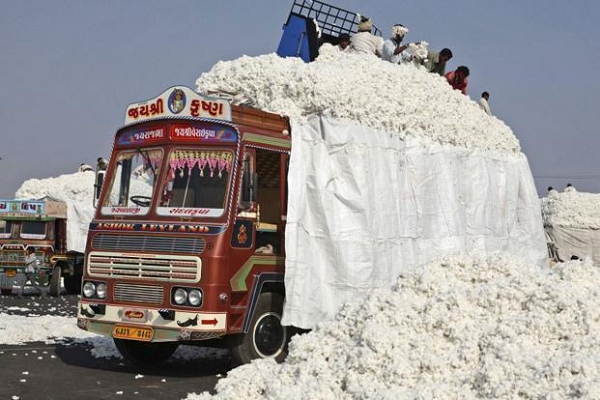
by Editor | May 25, 2021 | Business
 Islamabad, (IANS) The Pakistani senate committee on National Food Security and Research has asked the government to stop the import of cotton lint from India.
Islamabad, (IANS) The Pakistani senate committee on National Food Security and Research has asked the government to stop the import of cotton lint from India.
Committee chairman Syed Muzaffar Hussain Shah, chairing the meeting on Wednesday, said the country’s agriculture economy would be ruined if the import of 0.5 million bales of cotton from India through the Wagah border checkpost was not stopped, Dawn online reported.
It observed that the last season showed a 30 percent decline in cotton production, and added the figure could rise if immediate measures were not taken.
There is sufficient stock of cotton lint available with the Trading Corporation of Pakistan, so there is no justification to import cotton, observed the committee.
It also sought a report from the ministry of commerce on the import of cotton lint from India.
Minister for National Food Security and Research Sikandar Hayat Khan Bosan endorsed the recommendation.
The committee asked the government to immediately announce the intervention price for cotton as harvesting season is fast approaching. Punjab has already asked the federal government to announce the intervention (support) price.
Commerce Minister Khurram Dastgir Khan during a meeting with representatives of the Pakistan Cotton Ginners Association (PCGA) on Wednesday said his ministry would work in collaboration with the provincial governments to increase the production of cotton.
The meeting also discussed the role of Trading Corporation of Pakistan and the effect of import policy of cotton.
Khan said the government’s prime concern was to protect the interests of farmers besides boosting textile exports.
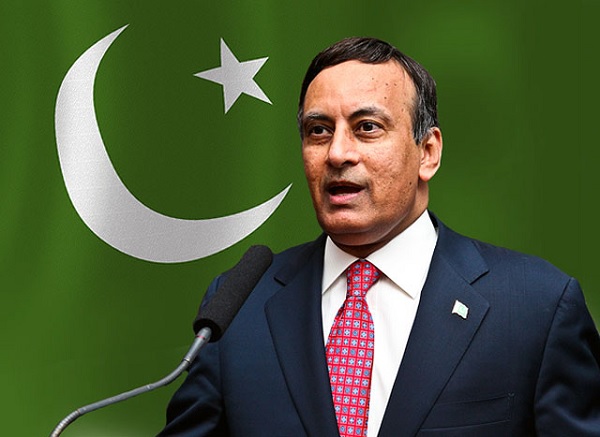
by Editor | May 25, 2021 | Interviews

Husain Haqqani, Pakistan’s former envoy to the US
New Delhi: (IANS) Prosecution of jihadis in Pakistan is difficult as the system considers them to be “the good guys”, according to Husain Haqqani, Pakistan’s former envoy to the US.
Talking about his latest book, ‘India vs Pakistan: Why Can’t We Just be Friends?’ Haqqani told IANS in an email interview that Pakistan considered jihad to be a low-cost option to bleed India and that this was the only way for it to ensure some form of military parity.
Haqqani, who’s an integral part of the powerful elite in Islamabad and was adviser to four prime ministers, talks in his written replies about jihad, relations with India, Pakistan’s own tryst with the scourge of terrorism, and the nexus between ISI — Pakistan’s military intelligence service — and the Islamic jihadi forces. (Excerpts)
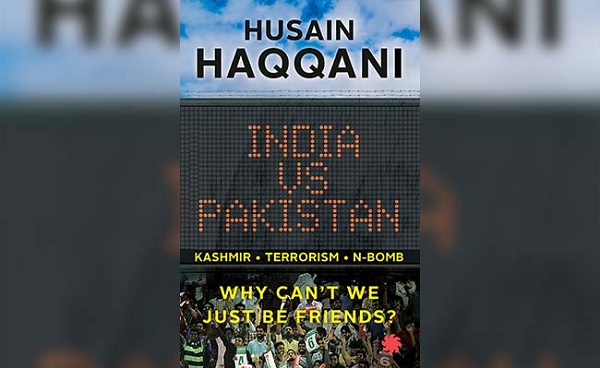
Cover Page: , ‘India vs Pakistan: Why Can’t We Just be Friends?’
Q. Can you explain ex-ISI chief Shuja Pasha’s statement on 26/11 terror attack, “Log hamare the, operation hamara nahi tha” (our people but it was not our operation)?
A. Pasha said, “our people” were involved, he didn’t say it was Pakistan army officers or ISI men. Pasha could have meant Pakistanis or he could be referring to LeT (Lashkar-e-Taiba) as “our people.” However, Pasha had told ex-CIA Director, General Michael Hayden, that “retired Pakistani army officers and retired intelligence officers” were involved in the planning. General Hayden says so in his book. Condoleezza Rice, then Secretary of State, has also written the same.
Since 26/11, Pakistan never went into the depth of the case even though proof was presented. We did arrest some, but we have not successfully prosecuted those responsible and until that is done, questions will remain.
Q. Rice had warned Pakistan to shut down terror operations. However, nothing has changed.
A. Prosecution is difficult in a system where jihadis targeting India are seen as ‘the good guys’. Yes, Secretary Rice had told Islamabad to shut down all terrorist operations. But that wasn’t the first time and certainly not the last. Pakistan has persisted with the same policy since the 1990s. When pushed by US on terror: first deny, then list Pakistani grievances, bring up Kashmir and blame India, provide commitments and assurances and end again with denial. This is not working.
Q. Though US had named Zakiur Rehman Lakhvi of LeT as the 26/11 mastermind, he is roaming around freely in Pakistan. What is stopping Islamabad from taking action?
A. Pakistan sees jihad as a low cost option to bleed India. The security apparatus views terrorism as irregular warfare. Islamabad feels this is the only way to ensure some form of military parity.
Q. Is there a concerted attempt by the Pakistan army to thwart peace talks?
A. As an analyst, I have seen that over the last 69 years, Indian and Pakistani leaders have met 53 times and yet been unable to change the course of their ties. Whenever the two try to move forward, the military has reacted. Civilian and army leaders have lost power after attempting to make peace.
Q. What should be Pakistan’s policy on Kashmir?
A. Having a normal relationship, people-to-people ties and trade doesn’t mean giving up on legal or political claim. The question I ask is: Is Kashmir really Pakistan’s ‘jugular vein’ if it has survived for 69 years without it? Should the two risk nuclear mass destruction over a quarrel they have not been able to resolve for so long?
However, Pakistan’s military has insisted on resolution of the Kashmir imbroglio before opening trade or travel.
Q. Pakistan’s Kashmir policy remains by and large in the hands of the military even when a civilian prime minister holds office. How can we expect a solution?
A. Under civilian prime ministers, Pakistan has moved forward with India. But Pakistan’s security establishment insists on controlling foreign and security policy, including the Kashmir policy. They have not been able to reach any long-lasting solution. Pakistanis realise that it is only civilian leaders who can actually reach a solution.
Q. In your opinion, Indira Gandhi had been magnanimous with the Shimla Pact, but Pakistanis saw the absence of pressure for a full settlement of Kashmir as an opportunity to keep the conflict alive. Should she have been more assertive on Kashmir?
A. Mrs Gandhi did not trust (prime minister) Zulfikar Ali Bhutto but she saw him as preferable to a military regime. For India, domestic unrest or balkanisation of Pakistan, is not a favorable development.
The compromise was to declare in Shimla that “the two countries are resolved to settle their differences by peaceful means through bilateral negotiations.” This was meant to preclude any future war.
Q. The book mentions how Pakistan intelligence had passed on the information of 10 terrorists who sneaked into Gujarat in March. Do you feel that its a sincere move to preempt a crisis after Pathankot?
A. It’s very positive that Pakistan has shared intelligence with India. But it was more because pressure from India and US. India cancelled scheduled talks and (Prime Minister Nawaz) Sharif was eager to resume dialogue. It was less likely that this move reflected concern for possible Indian casualties and was more to do with the need to deflect international pressure.
Q. Are you hopeful of a breakthrough in Indo-Pak relationship after Pathankot?
A. The two foreign secretaries met in New Delhi for the Heart of Asia conference and Prime Minister (Narendra) Modi is scheduled to travel to Islamabad for the SAARC summit in November this year. So, talks will continue as before but for a breakthrough, the two sides need to move beyond simply cancelling or rescheduling talks and create an environment for change.
Q. You also talk about the shrinking space for friendship and increasing ‘saffronisation’ of India. How harmful is this for ties?
A. Indo-Pak ties have become a victim of two parallel and contending nationalisms. In recent years, we are increasingly resembling each other in rage, resentment and public displays of religion.
Q. How do you see US policy towards Pakistan in the wake of US elections?
A. Neither of the current Presidential candidates have expressed a positive view of Pakistan. What should worry my countrymen is that entire US thinktank and the average American share the same view.
Hilary Clinton as Secretary of State in 2011 said, “You can’t keep snakes in your backyard and expect them only to bite your neighbors.” US policy towards Pakistan has been built on what I call ‘Magnificent Delusions’. Pakistan saw the US as its superpower ally who would build its resources to stand up to India, but Washington never saw India as a threat. US and Pakistan have very different goals but still assume they can get the other to work to their advantage.
(Haqqani’s book has been published by Juggernaut. Preetha Nair can be reached at preetha.n@ians.in)

by Editor | May 25, 2021 | News, Politics
 By Nivedita New Delhi (IANS) Indian Prime Minister Narendra Modi is one of the most “straight forward and outspoken” person, who can help in improving the relations between India and Pakistan, says Pakistan-India Business Council (PIBC) Chairman Noor Muhammad Kasuri, who worked closely with former prime minister of Pakistan, Benazir Bhutto.
By Nivedita New Delhi (IANS) Indian Prime Minister Narendra Modi is one of the most “straight forward and outspoken” person, who can help in improving the relations between India and Pakistan, says Pakistan-India Business Council (PIBC) Chairman Noor Muhammad Kasuri, who worked closely with former prime minister of Pakistan, Benazir Bhutto.
“I feel that the atmosphere has changed for the better in both the countries towards each other, and I think it will continue. Politically speaking. Prime Minister of India Narendra Modi is a very straight forward and outspoken leader, and I feel in the presence of such a strong-willed person, India and Pakistan relation has got a new breakthrough,” Kasuri told a small group of reporters in response to a question by IANS.
“I think in the last few years, things have changed for the better between both the countries. Perception and mindset of people have changed. Coming from Pakistan, we feel that why should we spend more money on importing things from other countries when we have India as a neighbour. It will be much easy to import from them,” he said.
Kasuri is confident that the trade dialogue between both nations will increase in years to come and shared that he has sent proposal to Minister of External Affairs Sushma Swaraj for the same.
“The trade dialogue between both the countries has increased. In fact, just today we sent a proposal to Sushma Swaraj for better trade relations. Now we won’t let this stop. I am expecting that the trade relation of India from Pakistan to touch $30 billion in the next five to six years.”
He feels that small efforts will go a long way in building a bond.
“He called the Pakistan premier for his oath-taking ceremony and he also attended his birthday in Pakistan. These things show that India and Pakistan relation has got a new high. I feel that in the next five years, things between both the countries will change for the better,” he added.
Kasuri was in the capital to grace the launch of Lifestyle Asia 2016 edition. The exhibition, which began on Friday, focuses on Pakistani and Indian craft, with over 60 stalls displaying designer and brand creations from both countries. Crockery, footwear, formal wear, bridal wear, artificial jewellery and Pakistani suits — there’s something for all.
“Our purpose is to make the relation between India and Pakistan smooth and the reason behind this exhibition is the same. This is about people-to-people contact,” he said.
(Nivedita can be contacted at Nivedita.s@ians.in)






